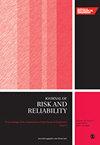Optimal defense resource allocation against cyber-attacks in distributed generation systems
IF 1.8
4区 工程技术
Q3 ENGINEERING, INDUSTRIAL
Proceedings of the Institution of Mechanical Engineers Part O-Journal of Risk and Reliability
Pub Date : 2023-10-26
DOI:10.1177/1748006x231196259
引用次数: 0
Abstract
The deployment of advanced information and communication technologies necessitates considering new security threats, such as distributed denial of service attacks and malware, which can fault power generators and feeders and exacerbate power outages in distributed generation systems (DGS). Existing cyber-security studies fail to validate the attacker–defender game model between operators and hackers or provide a DGS model that accounts for realistic characteristics and operations. Furthermore, current game models may be infeasible for large-scale systems and are not robust against uncertainties owing to the use of metaheuristic algorithms. To overcome these gaps, this study quantified the result of a game using the contest success function and estimated the parameters of this function based on real-world evidence: the dataset of cyber crime incidents from Advisen, US. The DGS management was optimized using the power flow model considering the scenario-based uncertainty stemming from cyber-attacks. A three-stage attack+defend–defend–attack framework is proposed to optimize attack–defense resource allocation using the cooperative game and [Formula: see text]-subgradient method. The results for IEEE 4, 13, 34, 123 and 342 test node feeders show that the proposed framework is applicable to large-scale systems and robust to various types of cyber-attacks. The proposed model and algorithms further enhance the DGS performance under uncertainties by protecting the entire grid or only critical nodes according to the defenders’ objectives.分布式发电系统对网络攻击的最佳防御资源分配
先进信息和通信技术的部署需要考虑新的安全威胁,例如分布式拒绝服务攻击和恶意软件,它们可能导致发电机和馈线故障,并加剧分布式发电系统(DGS)的停电。现有的网络安全研究未能验证运营商和黑客之间的攻击防御博弈模型,也未能提供一个考虑现实特征和操作的DGS模型。此外,由于使用了元启发式算法,当前的博弈模型可能对大规模系统不可行,并且对不确定性的鲁棒性不强。为了克服这些差距,本研究使用竞赛成功函数量化了游戏的结果,并根据现实世界的证据(来自美国Advisen的网络犯罪事件数据集)估计了该函数的参数。考虑网络攻击的场景不确定性,采用潮流模型对DGS管理进行了优化。利用合作博弈和[公式:见文]-子梯度法,提出了一种三阶段攻击+防御-防御-攻击的优化攻防资源配置框架。IEEE 4、13、34、123和342测试节点馈线的结果表明,该框架适用于大规模系统,对各种类型的网络攻击具有鲁棒性。提出的模型和算法可以根据防御者的目标保护整个网格或仅保护关键节点,从而进一步提高不确定条件下DGS的性能。
本文章由计算机程序翻译,如有差异,请以英文原文为准。
求助全文
约1分钟内获得全文
求助全文
来源期刊

Proceedings of the Institution of Mechanical Engineers Part O-Journal of Risk and Reliability
ENGINEERING, MULTIDISCIPLINARY-ENGINEERING, INDUSTRIAL
CiteScore
4.50
自引率
19.00%
发文量
81
审稿时长
6-12 weeks
期刊介绍:
The Journal of Risk and Reliability is for researchers and practitioners who are involved in the field of risk analysis and reliability engineering. The remit of the Journal covers concepts, theories, principles, approaches, methods and models for the proper understanding, assessment, characterisation and management of the risk and reliability of engineering systems. The journal welcomes papers which are based on mathematical and probabilistic analysis, simulation and/or optimisation, as well as works highlighting conceptual and managerial issues. Papers that provide perspectives on current practices and methods, and how to improve these, are also welcome
 求助内容:
求助内容: 应助结果提醒方式:
应助结果提醒方式:


